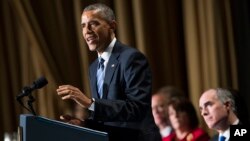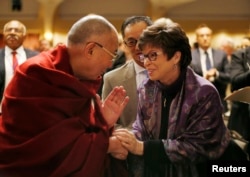U.S. President Barack Obama on Thursday called the Dalai Lama a "good friend'' and an inspiration for freedom.
President Obama has praised the Dalai Lama as a man of compassion, ignoring China's protest against any American involvement with the exiled Tibetan spiritual leader.
Obama did not meet directly with the Dalai Lama when they each attended the annual National Prayer Breakfast Thursday in Washington, but they were seated a short distance away from each other and exchanged greetings.
"I want to offer a special welcome to a good friend, his holiness, the Dalai Lama, who is a powerful example of what it means to practice compassion and inspires us to speak up for the freedom and dignity of all human beings," President Obama told about 3,600 religious and political leaders at the annual gathering.
Despite the Dalai Lama's insistence that he is only seeking autonomy for Tibet, China views the spiritual leader as a dangerous separatist, and regularly condemns leaders who meet with him.
Obama condemned those who seek to "highjack religion for their own murderous ends." He called the Islamic State militants who have overtaken parts of Syria and Iraq and beheaded Westerners it has captured a "death cult."
He said that "whatever our faith, we must be instruments of peace."
Obama praised Pope Francis and said he is particularly looking forward to welcoming him during his visit to the United States later this year.
Senior Obama adviser Valerie Jarrett was seated at the table with the Dalai Lama, a sign of White House support for his presence.
Before the prayer breakfast, two U.S. lawmakers told VOA that Chinese criticism of U.S. interaction with the Dalai Lama was unfounded.
"I think it’s profoundly unfortunate and an act of weakness for the Chinese government," said New Jersey Republican congressman Chris Smith, "to object to the Dalai Lama’s meeting with the president or members of the Congress or senators and being at the prayer breakfast."
New York Democrat Eliot Engel said, "There are always crackdowns on political dissidents and so I think that the Chinese government should clean up its own act before it criticizes other country’s people for inviting people to the prayer breakfast and other things like that.”
China's warning
The exchange may still rile China, which bristles at politicians meeting with the Dalai Lama. After the breakfast event was announced, Beijing said it opposed any country meeting with him under any circumstances.
Despite the Dalai Lama's insistence that he is only seeking autonomy for Tibet, China views the spiritual leader as a dangerous separatist, and regularly condemns leaders who meet with him.
"We are against any country’s interference in China’s domestic affairs under the pretext of Tibet-related issues, and are opposed to any foreign leader’s meeting with the Dalai Lama in any form,” China's Foreign Ministry spokesman Hong Lei said Tuesday.
Before the event, an English-language commentary issued by the state-run Xinhua news agency, which while not a formal statement offers a reflection of Beijing's thinking, strongly warned against any encounter.
"Chumming with a secessionist is playing with fire,'' the agency said. "If Obama meets the Dalai Lama, he will simply reverse the positive trends established by China and the U.S. in the development of their relations. For all that, any possible meeting or encounter with the Dalai Lama planned by Obama will dampen the hard-won positive momentum in China-U.S. relations,'' it said.
Outside the hotel hosting the event, nearly 100 supporters of the Dalai Lama waved Tibetan flags while across the street, about 50 people protested his presence.
Since taking office, President Obama has met the Dalai Lama three times. But none of the meetings have been held in public.
Over 3,000 people from various faith backgrounds are expected to attend the high-profile National Prayer Breakfast, which will focus on the importance of religious freedom.
Back story
The Dalai Lama fled to India after a failed uprising against Chinese rule in 1959 and has infuriated Beijing. He has said he simply wants autonomy for Tibet and does not advocate violence.
China rejects that, saying Tibetans enjoy religious freedom. Beijing also points to huge ongoing investment it says has brought modernization and an increased standard of living to Tibet.
Many Tibetans in China accuse the government of a campaign of religious and cultural persecution, as the country's majority Han ethnic group continues to move into historically Tibetan areas.
Since February 2009, more than 126 people have self-immolated in traditionally Tibetan areas of China to protest Beijing's policy in their homeland.
The Dalai Lama and the Central Tibetan Authority, located in India, are outspoken critics of China's policies, but have discouraged the suicide protests.
Some material for this report came from Reuters






